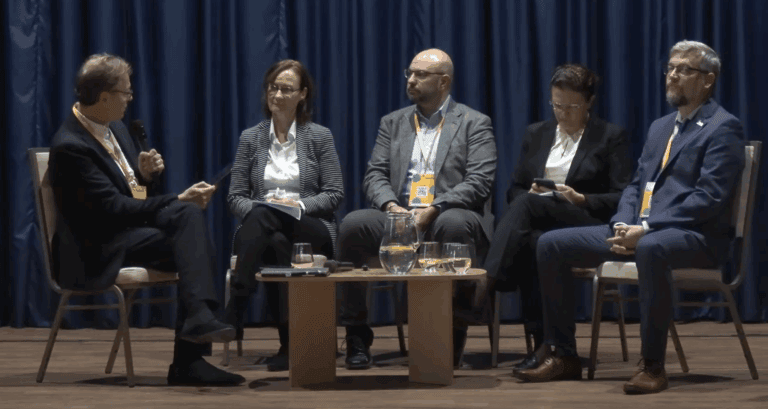Floris Faber, ACT Alliance EU
(The views expressed are personal.)
At this year’s Ambrela Development Forum in Bratislava, I moderated a plenary on “New Realities in Development Cooperation” with speakers from the European Commission Directorate-General for International Partnerships (DG INTPA), United Nations Development Programme Regional Hub in Istanbul, European Centre for Development Policy Management (ECDPM), and People in Need. The discussion revealed both the ambition and the uncertainty surrounding the EU’s Global Gateway strategy, and the space it leaves for civil society.
From investment logic to inclusive partnership
Erika Gerretsen (DG INTPA) described Global Gateway as a shift from a donor–recipient model to one of mutual interest and partnership. The EU’s “360 degree approach” aims to assess each investment’s economic, environmental, and social impact, keeping it values based and sustainable. Gerretsen said the concept is now defined on paper, and work is under way to put it fully into practice.
Civil society as a missing link
From the ground, Jan Mrkvicka (People in Need) warned that large investments risk repeating past mistakes if local civil society is not involved from the start. He argued that Europe must avoid repeating past mistakes by ensuring transparency, participation, and genuine local ownership from the outset. His initiative along the Lobito Corridor shows how communities can act as partners and watchdogs, ensuring jobs, skills, and protection go hand in hand with new infrastructure.
The UNDP’s Steliana Nedera underlined the same point from a governance angle: open civic space is the foundation of effective institutions. She described how UNDP’s new strategic plan places governance and rule of law at its centre, supported by digital transformation, gender equality, and sustainable finance as key accelerators. UNDP, she said, is adapting its work with civil society, from policy dialogues on shrinking civic space to initiatives such as Tadamon, which helps hundreds of local organisations strengthen their digital and financial resilience. But even as these partnerships deepen, she warned that the space for NGOs is narrowing fast, including in Europe.
Guarding principles in a changing system
Alexei Jones (ECDPM) called Global Gateway part of a wider “trilemma” between interests, values, and partnerships. His analysis, in his “Towards NDICI + Global Europe 2.0” article, suggests that unless safeguards are put in place, Europe risks letting short term strategic goals crowd out its human rights and governance commitments. He also argued that Europe must rebuild trust with its partners and local civil society by being transparent about its interests and embedding clear safeguards for governance and human rights in future instruments.
That tension ran through the whole discussion: how to combine political realism with a genuine commitment to local ownership, human rights, and inclusive development, the 360 degree approach. As I said in closing, principles and pragmatism must move together. Europe’s global role will be measured not by how much it invests, but by whether its actions lift people out of poverty, uphold human rights, promote inclusive development, and protect those most at risk.
photo credit: Ambrela



